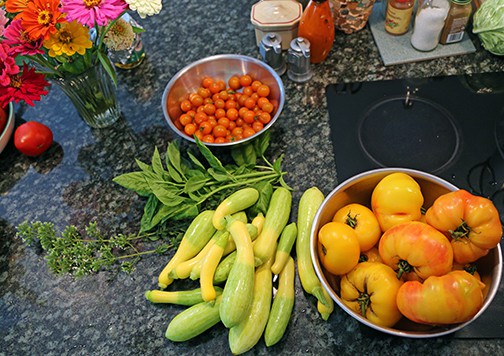A Gardening Life – April 4
This quote is currently making the rounds: You are what you eat, so don’t be fast, cheap, easy or fake.
Words to live by, and there’s no better way to take them to heart than to plant vegetables. When you grow your own food, it certainly isn’t fast. In the Northeast we begin planning and planting in April but most crops aren’t ready to harvest for six to eight weeks.
Vegetable gardening doesn’t have to be expensive but there it does require an investment of your time. You need to research what will grow well in your area, prepare the soil and tend the young plants. Weeds are relentless and the gardener needs to be equally persistent in order to prevent them from overrunning the garden. Some say “time is money,” and if this is true, growing vegetables isn’t cheap.
Although I wouldn’t say that growing edibles is hard, I will say that it requires attention. You need to keep on top of whether the garden needs watering or fertilizer. Outwitting the critters who want in on the harvest can be challenging, and once the produce starts rolling in it’s important to stay on top of the picking.
And fake? Fresh, homegrown food is the antithesis of fake. It is the most real, flavorful food you can put in your body, made all the more factual and authentic because you’ve watched it develop from seed to fruit.
If you don’t want to be fast, cheap, easy, or fake, plant vegetables and get real.
Sharing the wealth
Tips for first time veggie gardeners.
- It’s fine to start small. Till up a small area or make a raised bed; you can grow a good amount of food in a space that’s just four feet wide and eight feet long.
- Dig the soil up and loosen it well – have someone rototill it for you if that’s easier. After the first turning, do it again and mix in compost or composted manure and some granular organic fertilizer.
- Follow the directions on the seed packets for planting distances, but know that you can always thin out plants later if things get too crowded. If you alternate early crops (peas, radishes, beets, lettuce) with the later crops (tomatoes, beans, chard, squash) then those plants that are finished earlier can be pulled and the other crops will fill into those spaces.
- After seeds and young plants get established and start to grow don’t hand water. Irrigate your garden with soaker hoses or sprinklers, and water deeply every four to seven days.
- It’s easier to hoe weeds down when they are small than it is to pull them up once they have deep root systems. The types of hoes that are open can be pushed back and forth just under the surface of the soil, cutting the plant from the roots.
- Get in the habit of spending fifteen or twenty minutes in the garden every day; this practice is relaxing and in the end you’ll feel less pressured to get things done in one huge effort.
- Find ways to celebrate your bounty. Invite friends over for the first snap peas and salad or an all summer squash meal; leave a tomato and a bouquet of basil in the drive-up window at the bank; ask the neighbor’s kids over to help pull beets or dig potatoes. Never take such abundance for granted.
- Know this: even experienced gardeners have crop failures. One year something will thrive while another vegetable dies for no apparent reason. Focus on what’s growing well.



